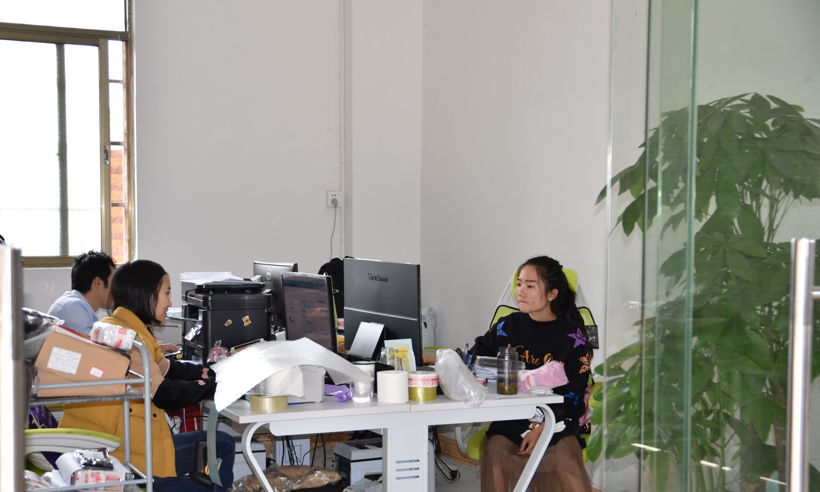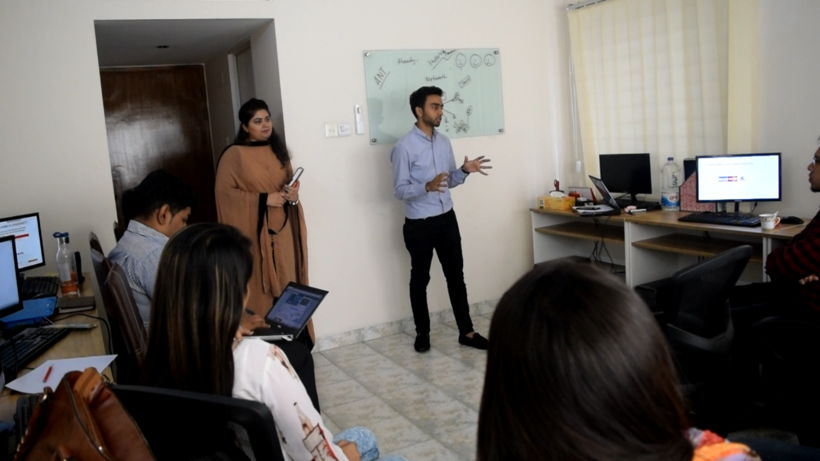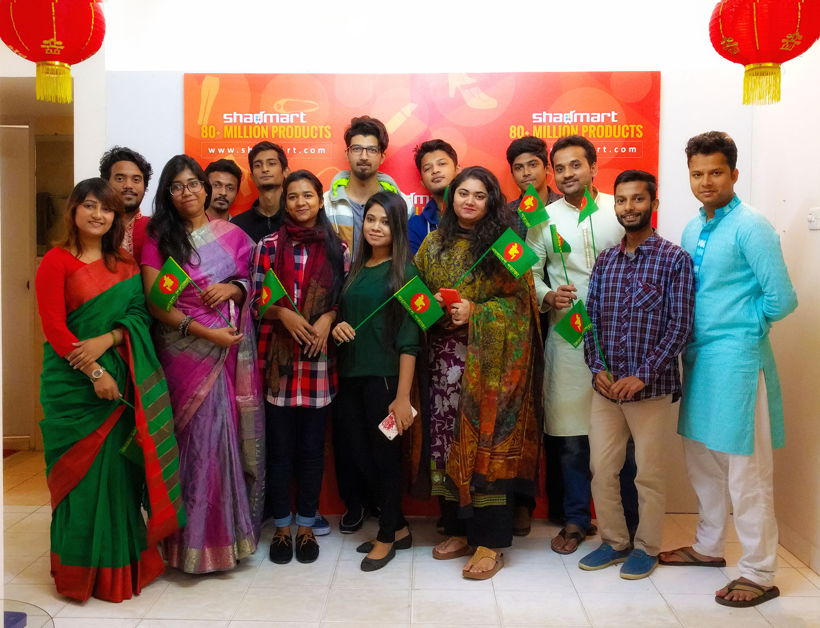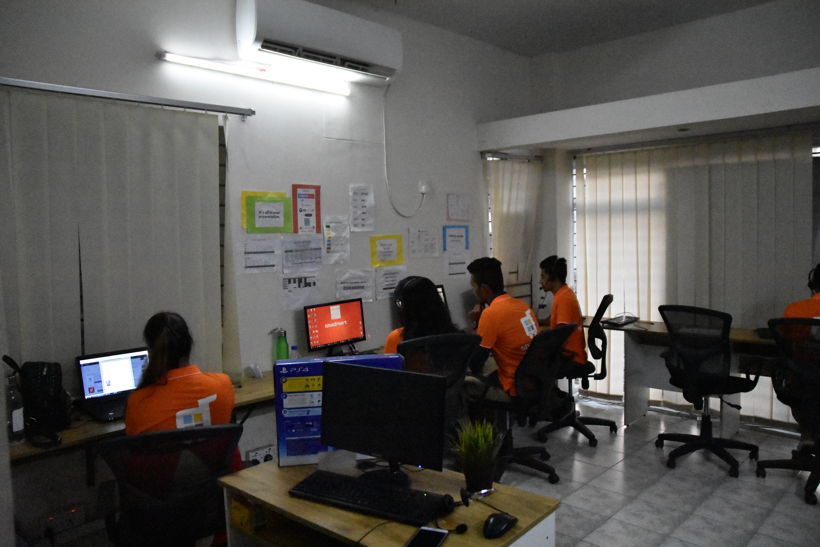

Since launching Shadmart 3 years ago, Shadman Sakib and the team have successfully positioned the company as a leading cross-border e-commerce company in the country, from what began as a modest operation of a few people. Shadmart is now a team of over 32 people, it has a widespread brand awareness in the market as a reliable e-commerce company that delivers high-quality products.
The most interesting and important thing about Shadmart is that it is a technology company at its core. It is true that almost all the e-commerce companies in Dhaka have a tech stack, but the tech is a priority for a very few companies. Having a tech stack is critical for several reasons: 1) it allows you to scale fast and efficiently and 2) at the same, it allows you to control cost. Shadmart, among all the e-commerce companies in Dhaka, has been doing this right. As Shadman says, “our aim is to make our process 90% automated first” and “hopefully, we will be done with it in the next few months.”
Over the past months, Shadman has assembled a complementary team which has meaningfully helped Shadmart position itself as a destination for high-quality products, ensure superior customer service and makes it a shopping destination for a growing number of people.
Future Startup’s Ruhul Kader speaks with Shadman Sakib, co-founder and CEO of Shadmart, one of the youngest and dynamic tech CEOs in the country, to find out more about and understand Shadmart, its business and secret and to pick his brain about Shadmart journey, the state of its business today, long-term strategy and ambition and future plans, future of e-commerce and digital payment in Bangladesh and his lessons from his journey as a young entrepreneur and CEO and contemplates what future may bring for the e-commerce industry in Bangladesh.
Future Startup
Tell us about your childhood, your education, and about your journey to where you are today.
Shadman Sakib
I was born and bred in Khulna where I stayed until I was in the eighth grade. Then I shifted to Dhaka and finished my 'O' level and 'A' level. In 2013, I moved to China to pursue higher education.
While studying there, I met a Chinese friend who was very enthusiastic in nature and eager for doing something meaningful. Both of us had ambitious ideas that converged with each other. We, as a result, formed a team and participated in an entrepreneurship competition organized by our university. For that competition, we had to prepare a brief business plan. That was the point where the idea of Shadmart had actually come into being. We were still sophomores.
While mulling over the idea, I observed some critical issues. I noticed, for instance, the products that are imported from China to Bangladesh are usually of low-quality. What happened is that most of the Bangladeshi importers purchased cheap, low-end products and brought them here to sell at a margin.
With our business model, we wanted to address this issue and develop our supply chain system. For that, we needed to design a website first. Luckily, I had a domain bought in my name early on and we decided to proceed with it. We were a bit confused about what we should name our venture; but, eventually, we went with just Shadmart agreeing that it's what we were doing that matters, not how we name it.
At the initial stage, we were fortunate enough to receive mentoring from our university faculties. Before long, we were able to set up our business and registered in the Ningbo city of Zhejiang province in China. The city government there is very business-friendly and provides regular aids to budding entrepreneurs through means like business competitions and different incubation facilities. We participated in such a competition and was awarded a 300sq.mt. office space.
By then, we were already in 2015. In August 2015, we began our operation. I had three of my friends here at Bangladesh who looked after the financing and customer support divisions of the business. In China, on the other hand, my co-founder and I were managing the supply chain. Our team was small like this until mid-2016. We were using messaging service to communicate with our customers.
After the second quarter of 2016, we noticed that instead of using instant messaging services, our customers wanted direct communication to ensure credibility. As a result, we decided to scale up and hire a bunch of new customer care executives and start operation in Dhaka. We also expanded our office space during that time.
[su_divider top="no" divider_color="#adacab" link_color="#edde29" size="1"][/su_divider]

A Message From SSLCOMMERZ
This story is made possible in part by our friends at SSLCOMMERZ, whose generosity enables us to publish premium stories online at no cost to our readers. SSLCOMMERZ is the country's largest and most reliable payment digital payment facilitator with over 2000 partners. Team SSLCOMMERZ works hard every day to enable your business online. Make payment simple for your customers, today. Learn more here.
[su_divider top="no" divider_color="#adacab" link_color="#edde29" size="1"][/su_divider]
While studying there, I met a Chinese friend who was very enthusiastic in nature and eager for doing something meaningful. Both of us had ambitious ideas that converged with each other. We, as a result, formed a team and participated in an entrepreneurship competition organized by our university. For that competition, we had to prepare a brief business plan. That was the point where the idea of Shadmart had actually come into being. We were still sophomores.
FS
Let me rewind a little bit. So, first, you had this business idea and attended a competition which you won, and was provided with an office. Besides that, you needed capital and other primary resources. How did you manage to put everything together and build the initial operation?
Shadman Sakib
Both my co-founder and I had some personal savings. I was able to save money by selling products on eBay, and by carrying out drop shipping business through Amazon. In fact, I had been doing drop shipping since my O’level. So, our initial investment was provisioned from our savings, although fairly meager in amount.
Afterwards, we built a database by collecting information from various individual merchants and companies in China. My co-founder is a programmer. He built a software for us, which in fact is our core technology stack, and integrated our suppliers' database into it.
Fortunately, we didn't face many obstacles in the beginning since both our university and the local government patronized us. So, despite our little capital, we managed to cut down our costs to the minimum. Moreover, we didn't have to open a marketing department right at the outset since I had learned basic marketing tactics from my early experiences in drop shipping.
My partner, on the other hand, was tending to the Chinese personnel we were doing business with. So, with two of us managing the China operation and a few of my friends looking after the operation in Bangladesh, we maintained a great balance.
Both my co-founder and I had some personal savings. I was able to save money by selling products on eBay, and by carrying out drop shipping business through Amazon. In fact, I had been doing drop shipping since my O’level. So, our initial investment was provisioned from our savings, although fairly meager in amount.
FS
If I get it right, you didn't have any customer in Bangladesh, in the beginning, meaning your sales volume was not that big. But, in order to onboard the suppliers, you needed to convince them that you'd be able to fulfill your sales quota. How did you manage that?
Shadman Sakib
Actually, it wasn't hard to convince them. As I've mentioned earlier, I was in the drop shipping business for several years and, at that time, was exporting goods to Malaysia and other countries. My partner also had connections with some factories around China. These were footwear manufacturers and our plan was to start off with shoes only.
So, we approached these companies and offered to sell for them if they provide quality products at agreeable prices. We were able to make partners with 15 companies, initially. And, when I began promotional campaigns for our business, we began to receive orders from customers.
The major problem at the initial stage was establishing credibility to the customers. Two questions were commonly asked every time we had a new customer: a) Where's your showroom? b) What's your phone number? to which we didn't yet have satisfactory answers at that time which eventually led to the expansion of our operations in Dhaka.

FS
Let's fast forward to the present now. Please give us an overview of Shadmart now? What products and services are you offering and how big is your operations now?
Shadman Sakib
In 2016, as I've said earlier, we scaled our business and broadened our employee base to fill different positions. At present, we have 32 employees including the ones in China.
The number of our verified, registered customers now stands at 45,000 now. We usually receive around 35,00 to 4000 orders per month for Bangladesh. We have recently launched a new and user-friendly design of our website.
During the first 4 months of our operation, we only sold shoes. In the meantime, we were also trying to strike deals with other merchants in China. Just after the first quarter, we were able to onboard new merchants and add new products to our inventory. You would be astonished to know that we now provide 80 million plus products under numerous categories through Shadmart.
FS
How does your process work, particularly back-end which basically enables your sales in Bangladesh?
Shadman Sakib
Every portion of our operation is interlinked. From our early experience, we know what key aspects customers in Bangladesh seek for.
Product quality is one of their major concerns. So, how we tackle this issue is by attaching real photographs of the products on our website. Add to that, we also provide statistics of how many times a particular product has been sold in China. This data is real-time, fed by our own software system.
In 2016, as I've said earlier, we scaled our business and broadened our employee base to fill different positions. At present, we have 32 employees including the ones in China. The number of our verified, registered customers now stands at 45,000 now. We usually receive around 35,00 to 4000 orders per month for Bangladesh. We have recently launched a new and user-friendly design of our website.
FS
How does your process, from product procurement from suppliers to product delivery to customers, work? Also, a little bit on your business model, given that you offer deals as well.
Shadman Sakib
We don't keep any inventory, as you may know. So, whenever an order is placed, we start the procurement process. We've got our own warehouse in China. So, when we request products from our suppliers in China, they deliver it to that warehouse. Then, the products are shipped to Bangladesh from there.
Regarding legal issues, compliance is, of course, our top priority. When we receive our shipments, we usually separate our products category-wise and send it to the customs office.
For each shipment, we use LCs. Afterwards, when we get our products back from assessment we again arrange them according to individual orders and then deliver it to the intended customers.
We have a marketing team in China who conducts a weekly survey in China to identify the most sold products there. Then they request us to determine good pricing for the products so that they can negotiate with Chinese merchants. When they manage to cut a deal in these products, we immediately add them to the "Deals" page on our website.
As for discounts, almost all of our products are sold at lower prices. Although in case of special products, we offer special discount rates and advertise them on Facebook. To receive regular product updates, people can also subscribe to our newsletter.
FS
As the sole marketer in the early days, how did you rack up users and grow your business?
Shadman
Our first priority has always been customer satisfaction. To this day, we didn't need to spend high budgets for marketing. Word-of-mouth marketing worked like a charm in Bangladesh for us. Then again, we also advertised on Facebook.
Despite being a small team, we have been successful till now in growing our business. It's been possible because everyone in our team is nicely synced with each other.
We also haven't raised funding yet. Our aim is to make our process 90% automated first. When the automation is done, we will be scaling up our business which will need a fresh round of investments. Hopefully, in three months from now, we will finish automation work.
Product quality is one of their major concerns. So, how we tackle this issue is by attaching real photographs of the products on our website. Add to that, we also provide statistics of how many times a particular product has been sold in China. This data is real-time, fed by our own software system.
FS
What are the things you are doing marketing-wise now?
Shadman
Facebook still remains as our key marketing platform. But we also plan to go with affiliate marketing by collaborating with celebrities soon. our technology for affiliate marketing is almost ready, it will be on soon.
FS
What are the challenges for Shadmart now?
Shadman
Our major challenge is still the management of lead-time. Since we provide imported goods, we are often troubled with inevitable legal issues. Sometimes, product inspection and paperwork take too much time at the customs.
Another challenge for us at present is the payment methods. There are credibility issues among first-time customers surrounding the advance payment. Product delivery is also a concern since we are using third-party logistics service for now.
Our aim is to make our process 90% automated first. When the automation is done, we will be scaling up our business which will need a fresh round of investments. Hopefully, in three months from now, we will finish automation work.
FS
What percentage of your payments are done online?
Shadman
About 30% of our total payments are made online. The rest of customers pay via mobile payment services, such as--Bkash.
For users who pay via debit/credit cards, we take 100% payment upfront because the process gets much easier by doing so. In case of MFS payment services, we request 50% advance payment and 50% to be paid upon delivery.
FS
What local payment gateways do you use?
Shadman
Mainly we use SSL Wireless, Bkash, and Bank Transfers services for our local payment. For our international customers, we also receive payments via PayPal.
It should also be mentioned at this point that besides Bangladesh we are currently shipping products to 10 other countries including USA, Nigeria, and the UK.
We don't have direct operations there. So, when an order is placed from those countries, we receive the payment online and then ship it to them through international courier services like DHL.
Our major challenge is still the management of lead-time. Since we provide imported goods, we are often troubled with inevitable legal issues. Sometimes, product inspection and paperwork take too much time at the customs.
FS
How do think about competition in the market?
Shadman
We feel that our nearest competition is the e-commerce business. Their advantage is that they don't need to keep an inventory and can collect products from local suppliers within a short period. But, as we procure our products from foreign suppliers and clear them up on customs, upon their arrival, our lead-time is longer than the e-commerce’s'.
On the other hand, when we bring our customers products from China, unlike other services we do ship the products directly to our customers. This is one of the many reasons which validate our relatively higher shipping charges.
We also find it hard sometimes to convince people that ours is an international company; although, over the time we have been able to retain a group of loyal, returning customers.

FS
So, as far as I understand, Shadmart is a marketplace where you allow brands to sell products, albeit Chinese companies and customers to buy them directly. and you make money in the form of commission.
Shadman
Actually, we don't describe Shadmart as a marketplace. We are basically a business-to-customer company because we have our own warehouse in China. So, when products arrive from the suppliers to that Chinese warehouse, our quality control staff there match it with the requirements. Then, they send them to Bangladesh where we conduct another quality check.
So, you see how we care for our customers and make sure that they receive exactly what they've wanted. For our commitment to the customer satisfaction, we call ourselves a B2C business.
We get our cut from the suppliers by charging a varying rate of commissions for selling their products. This is the only point where our profit is generated.
FS
Do you have any plan to work with suppliers in Bangladesh?
Shadman
Of course. We definitely want to collaborate with local suppliers. But first, we need them to be more technologically sophisticated.
They need to update different technical aspects of their business so that it becomes easier for us do business with them in a fair and profitable-for-everyone manner.
we don't describe Shadmart as a marketplace. We are basically a business-to-customer company because we have our own warehouse in China. So, when products arrive from the suppliers to that Chinese warehouse, our quality control staff there match it with the requirements. Then, they send them to Bangladesh where we conduct another quality check.

FS
What are your plans going forward?
Shadman
As I've been discussing earlier, our first priority now is to make almost 90% of our operation fully automated. We also have plans to integrate artificial intelligence (AI) in our system, especially in parts like customer service, dispute resolution, and logistics solution.
AI will be of great assistance to our personnel in making quick, effective decisions and providing better solutions to the customers.
We have something called an Experience Center in Banani where customers can come and experience their desired products if they so choose. We plan to open few more these centers in different parts of the country.
Although we're only importing products from China now, we have plans to create similar supply chain solution from the USA, Taiwan, Singapore, Korea and also collaborate with the local suppliers in the near future. We wish to make an arrangement with local entrepreneurs where we'll set up kiosks for them to sell our products in their localities.
One of our major plans for the next 5-6 years is to launch our own brands, which is private level brands, of best quality at an affordable price. There won't be too many categories but a small number of products which will be of hi-quality.
As for our business growth, we are aiming ambitious targets in coming years. Despite the volatility of our market, Shadmart is growing at an annual rate of over 70% till now.
FS
If you look back at the time you started and today, how much has Shadmart evolved?
Shadman
Credibility, to me, is the first thing that comes to my mind while talking about changes in Shadmart. Our customers now rely on us.
During last 3 years, we have been able to fine-tune our operation according to the customers' expectations.
We have successfully truncated our lead-time from 45 days to 14-15 days. We now aim to lower it to a week. With this and other similar initiatives, our customer reliance is satisfactory now.
As I've been discussing earlier, our first priority now is to make almost 90% of our operation fully automated. We also have plans to integrate artificial intelligence (AI) in our system, especially in parts like customer service, dispute resolution, and logistics solution. AI will be of great assistance to our personnel in making quick, effective decisions and providing better solutions to the customers.
FS
From your experience in working in the e-commerce space in Bangladesh, what bottlenecks/challenges do you think are critical?
Shadman
E-commerce has a huge potential here, no doubt about it. But one of the major issues persistent today is building the trust among customers. It's especially difficult given that people here still feel suspicious of purchasing online. Their suspicion, in fact, is not baseless.
A handful of e-commerce businesses have previously wronged customers. This has unfortunately contributed to our primary perception of online companies. It still persists.
To beat this evil, online companies need to ensure utmost customer satisfaction. Products should be delivered just as ordered and in time.
Here, delivery would be another critical challenge. My experience with Chinese transportation, although they are different in many aspects, says that if we can improve our logistics and ensure smooth transportation, e-commerce will grow enormously in Bangladesh.
At present, our e-commerce industry is in a state where the first priority is to bring in new customers and build their trust. In my experience, customer loyalty in Bangladesh is of an especially kind. If you provide your customers with quality products and better service, it'd always play out as a competitive advantage for you.
FS
What percentage of your customers are from Dhaka and from other parts of the country?
Shadman
The biggest chunk of our existing customer base lives in Dhaka. It's almost 50%. The rest of the customers is from Chittagong and other major cities.
E-commerce has a huge potential here, no doubt about it. But one of the major issues persistent today is building the trust among customers. It's especially difficult given that people here still feel suspicious of purchasing online. Their suspicion, in fact, is not baseless. A handful of e-commerce businesses have previously wronged customers. This has unfortunately contributed to our primary perception of online companies. It still persists. To beat this evil, online companies need to ensure utmost customer satisfaction. Products should be delivered just as ordered and in time.
FS
eCommerce and many tech businesses can be characterized by "winner takes it all nature" where one of the companies becomes so large that it either buys the smaller ones or simply gobbles them up. It happened in case of Amazon and Alibaba. How do you think this type of competition?
Shadman
Competition is a reality in every business. In my opinion, it's the people who turn a small company into a big one, not just the idea. Amazon or Alibaba can come to Bangladesh one day and eye for buyouts, but if our local companies have loyal employees committed to their jobs and loyal customers who are happy with you, competition should not be a matter of concern.
This is, to be honest, one of our advantages at Shadmart that we've got a loyal, committed team. If we continue to fulfill our responsibilities and improve our operation regularly, we won't have any reason to fear big competition.

FS
Please tell us about your culture at Shadmart, how do people work and collaborate?
Shadman
Despite our small employee base, our business is run under a divisional model with 7 distinct departments. Each of these departments has a head, all of whom meet every week to evaluate work progress.
Every 3-4 months, we have an all-employee conference which also invites our team in China. In these meetings, we invite employee feedback. We take extra care of critical employee issues and resolve them in an effective manner.
FS
What are the personal challenges do you face as a young entrepreneur? How do you tackle them?
Shadman
There are, you know, usual mishaps in the business like when performance doesn't match with plans.
In such times, I open up the file where we keep positive reviews and experiences shared by our customers and read them. This makes me feel relieved and motivates me to get started again.
FS
You started business pretty early, what are some of the biggest lessons from all those years?
Shadman
Over the span of my career, I've learned that it's important to have a dream and nurture a vision. One also needs to stick to the dream to fulfill it. There's no alternative to determination and organization.
It's also important to have friends. Entrepreneurship is a tough journey and a risky one as well. It often takes a heavy mental toll. In times when I feel down, my friends are the ones who come forward and help me rise up. They are also the ones who push me to go beyond my natural limit and do something extraordinary.
FS
What is your management philosophy?
Shadman
I don't believe in retaining authority as may be evident in our organizational design. At Shadmart, we delegate responsibilities to different departments and provide them autonomy. This is an effective design since most of the time I work remotely.
FS
What suggestions would you give to young CEOs to become more effective at their work?
Shadman
My first suggestion which is also from my own learning is that you need to persevere for whatever you wish to gain.
Obstacles are a broiling reality for entrepreneurs, and especially in a country like Bangladesh it almost seems like the everything is against you. But determination is a must in the face of the impediment.
There's also an existing practice in our country to import ideas and concepts from the west as is. But these ideas and concepts are developed in a different set up which won't run in our context. So, we need to focus on solving our problems in our own way. The possibilities become manifold that way.
It's also essential for chief executives to be humble. Humility is a virtue.
Entrepreneurship is a tough journey and a risky one as well. It often takes a heavy mental toll. In times when I feel down, my friends are the ones who come forward and help me rise up. They are also the ones who push me to go beyond my natural limit and do something extraordinary.
FS
A couple of books that you have enjoyed reading and would like to recommend to others.
Shadman
One of my all-time favorite books is the Poor Dads, Rich dads. I read it back in 2014. I have also read Millennials' Success Habits recently which is an excellent read. The Idea Factory' by Jon Gertner and 'Tools of Titans' by Tim Ferriss are two books I enjoyed reading.
FS
Name a few things you'd do differently if you had another chance to start over.
Shadman
Should I have the opportunity, I'd concentrate more on adapting to technology on my business work process from the very beginning. I'd also emphasize more on team development.
FS
Did you ever have a strong belief or idea which you discarded over the time?
Shadman
Yes. I once believed that academic education is necessary to be successful in any given field. But as my experience broadened, I observed that people can nurture their potentials and cultivate essential skills even without a university degree.
My first suggestion which is also from my own learning is that you need to persevere for whatever you wish to gain. Obstacles are a broiling reality for entrepreneurs, and especially in a country like Bangladesh it almost seems like the everything is against you. But determination is a must in the face of impediment.
FS
How big is your board?
Shadman
In Bangladesh, our company is registered as a proprietorship business. So, we don't have any board of directors here.
And, over there in China, Shadmart is registered as a limited liability company where my co-founder and I serve as the directors.
I once believed that academic education is necessary to be successful in any given field. But as my experience broadened, I observed that people can nurture their potentials and cultivate essential skills even without a university degree.
[su_note note_color="#ffffff" text_color="#050a45" radius="15"]One more time, this story is made possible in part by our friends at SSLCOMMERZ, whose generosity enables us to publish premium stories online at no cost to our readers. SSLCOMMERZ is the country's largest and most reliable payment digital payment facilitator with over 2000 partners. Team SSLCOMMERZ works hard every day to enable your business online. Make payment simple for your customers, today. Learn more here.[/su_note]
-
Notes
1. Interview by Ruhul Kader, Transcription by Rahatil Ashekan
2. Further reading on the future of ecommerce in Bangladesh here.
3. Cover photo by Shadmart, (Shadman Sakib, first (sitting) from the right)
4. This story has been updated with new photos on February 15 at 8:48 PM.
